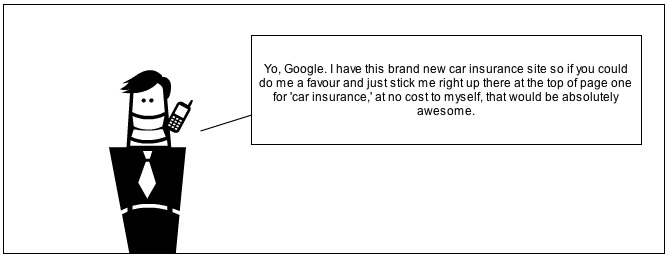Google is one of the most powerful marketing tools available to businesses at present. With more than 88 billion searches per month, it attracts a global audience searching for anything from funny videos to car insurance.
In fact, in May, Google became the first ever business to boast more than 1 billion unique users visiting its sites over the course of a month. That’s one in 7 people on the planet visiting one of the Google sites during May.
It’s little wonder then that its PPC advertising is worth billions to the web giant. Everyone wants their website to be visible to an audience already searching specifically for their products and services.
Of course, this has given rise to a SEO industry that caters to businesses seeking the often more sustainable ‘organic’ listings. Often, businesses can be priced out of PPC with a model based on awarding visibility to those who are prepared to pay more.
It is perfectly feasible for a company to become entirely reliant on the business generated through this one search engine.
So what happens if there is an algorithm change or similar that effectively removes a company’s visibility, thus slashing its revenue?
There is no denying that this is absolutely devastating for a business. A quick search online will reveal a number of stories of this nature including some where people have even threatened to sue the search giant for their poor rankings (many such cases have been simply thrown out of court).
Google Listing Isn’t a Basic Human Right
There’s a common theme that runs throughout many stories of people trying to sue Google for poor rankings – everyone seems to come across as though they believe it’s their right to have high organic listings in Google.
As both a search engine user and someone working in SEO, this bothers me.
The fact is that Google can be seen as a marketing tool and you have no more a right to rank well in Google than you have to prime time TV coverage, or cost free newspaper advertising.
Google is fundamentally delivering a service to search engine users. Users want to type a query in and find the most relevant and highest quality results. If your site doesn’t fit the bill, why should it be there?
The search engine has a published list of best practice guidelines for Webmasters and a whole host of free to use tools (Google Analytics, Webmaster Tools etc) to help websites to understand their ranking and their traffic and analyse any problems quickly.
Getting Ranked and Staying There
Increasingly, websites need to consider their content quality, freshness, relevance and originality. Rand Fishkin of SEOMoz recently posted a video covering best practice techniques that have more and more prevalence since the recent Google Panda update.
Of course, in addition to this you really do need to have links pointing to your site from other high quality websites and it helps to have a brand that is being actively engaged with on social media channels.
Achieving high rankings, particularly on competitive keywords, is not easy. SEO is complex and requires varied, well thought out strategies to ensure results that are sustainable.
Gaming the algorithm with the mass purchase of spammy, irrelevant links can get you penalised. Google is open about this so if you incur a penalty as a result of such activity, you can hardly blame Google. Spammy link building has a limited lifespan. It is not sustainable.
By the same token, methods that worked well 2 years ago are no longer as effective. Sometimes websites are caught out not through spammy methods, but simply by not keeping up with changes. The fact is that Google makes more than 400 changes a year to its search algorithm, only ever announcing the biggest. Every change is geared towards improving search results quality for users. In order to maintain rankings, you really need to be continually working on creating a higher quality website for users and creating a glowing backlink profile.
An Imperfect Algorithm
Every algorithm can be manipulated. Google’s is by no means perfect. But it’s getting better and better all the time at understanding ‘quality.’
It’s frustrating when websites using spammy techniques and presenting poor quality outrank you and this does still happen. But it’s becoming less and less frequent all the time.
The best bet? Concentrate on your site, on its content, its link profile, its quality, originality and online brand awareness…. And keep one eye on forthcoming changes at all time.
No site has a divine right to rank well in Google and I for one, as both a Google user and SEO, am glad of the non-public algorithm and its constant quality improvements.





